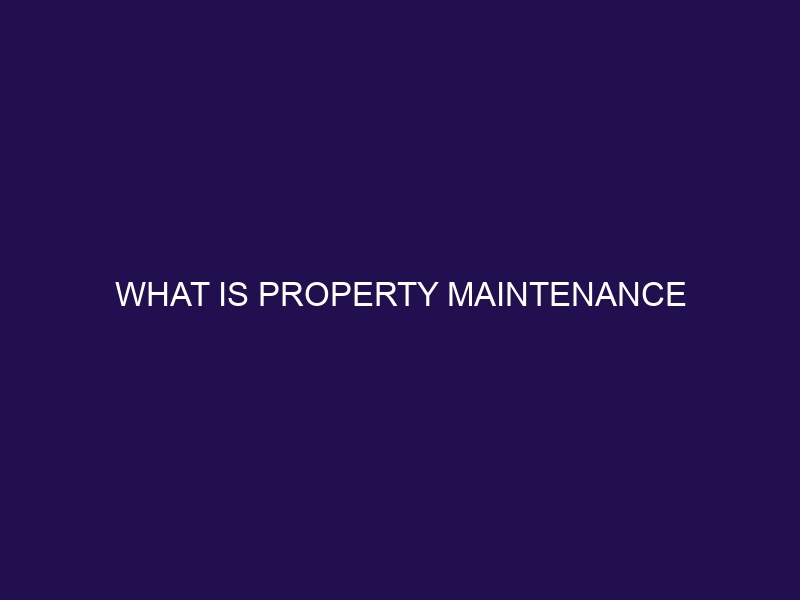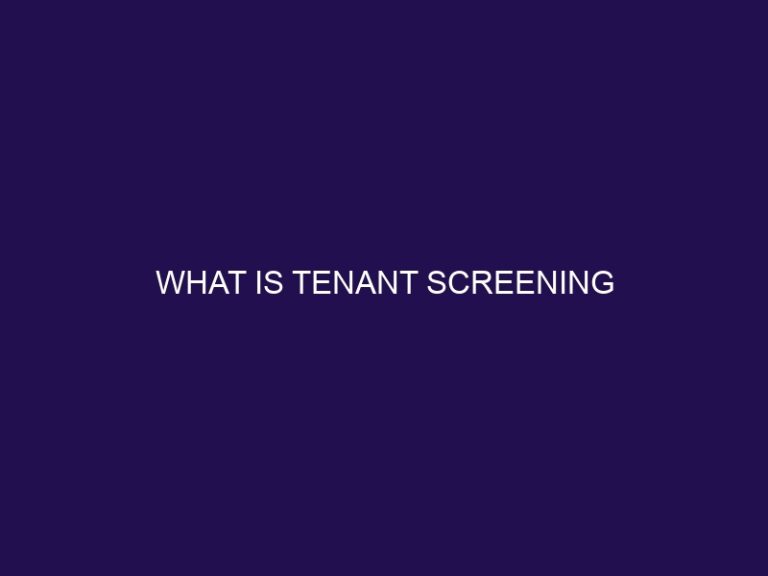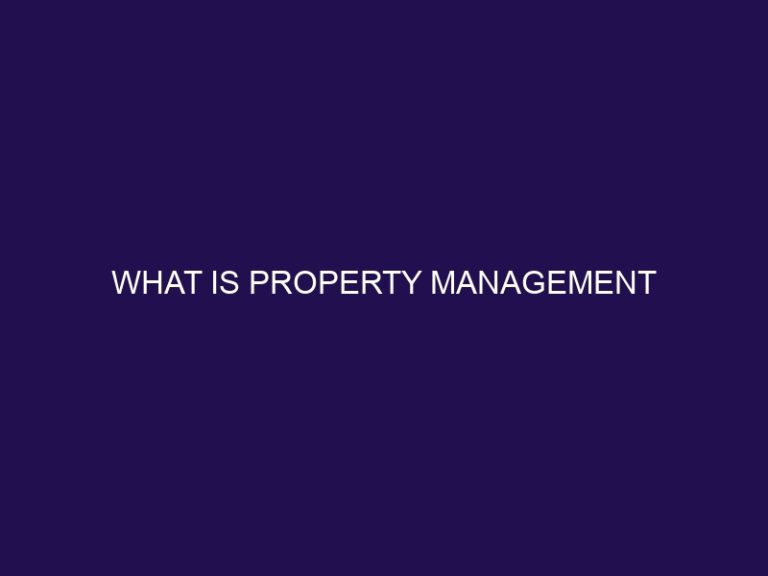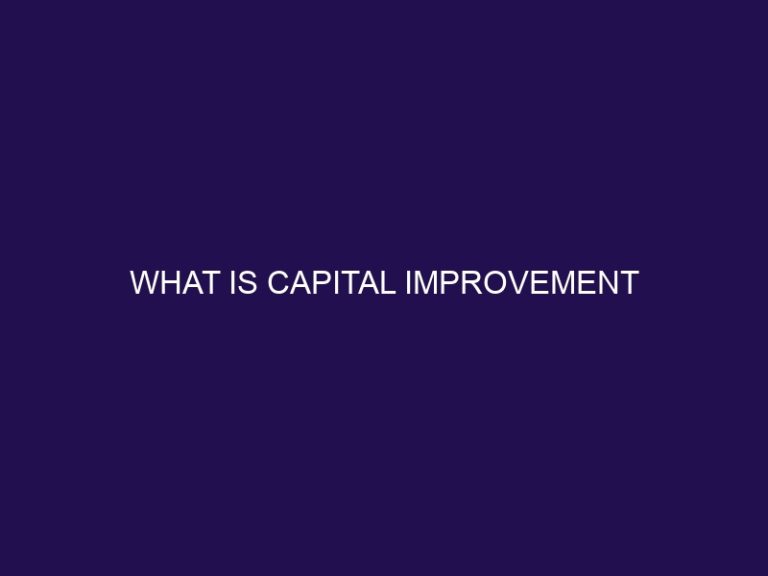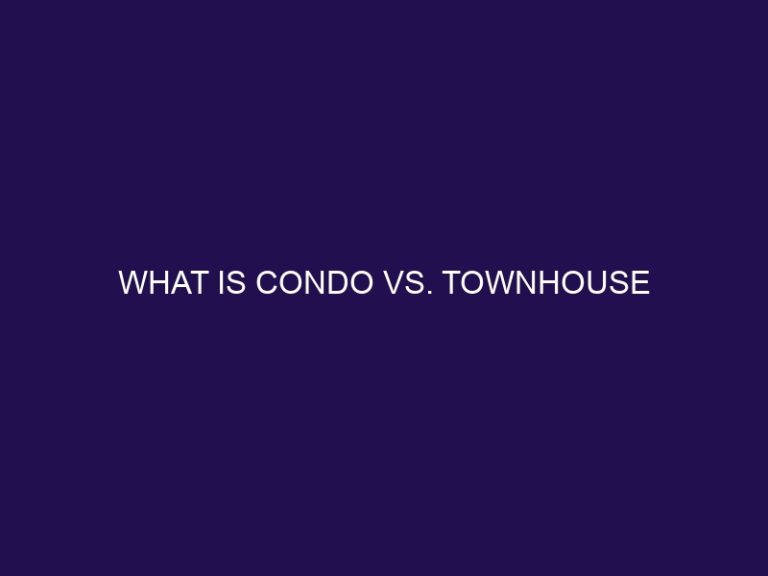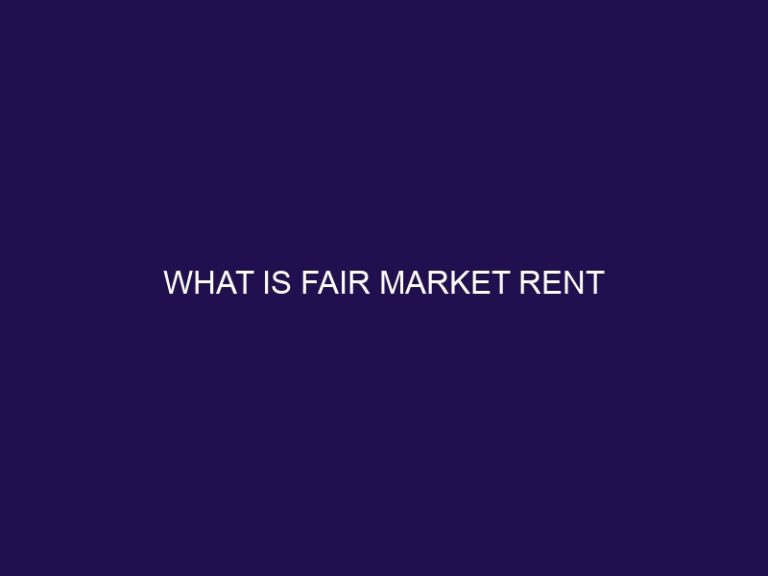What is Property Maintenance
Property maintenance plays a crucial role in ensuring the optimal functioning and preservation of various types of properties. Whether it’s a residential building, commercial establishment, or even public spaces, property maintenance is essential for maintaining safety, security, and overall property value.
Property maintenance can be defined as a series of tasks and activities aimed at keeping a property in a good condition, addressing issues promptly, and preventing potential problems. It encompasses various aspects, including repairs, upgrades, inspections, landscaping, and groundskeeping.
Having proper property maintenance is vital for several reasons. Firstly, it ensures the safety and security of occupants by identifying and addressing potential hazards or risks. Secondly, it helps preserve the value of the property over time, making it an attractive investment. Lastly, property maintenance contributes to creating a positive living or working environment for residents or employees.
There are different types of property maintenance, including preventive maintenance, corrective maintenance, and emergency maintenance. Preventive maintenance involves regular inspections and proactive measures to prevent problems before they arise. Corrective maintenance addresses issues as they occur, while emergency maintenance focuses on urgent repairs due to unforeseen circumstances.
Some common property maintenance tasks include conducting regular inspections, performing necessary repairs and upgrades, and maintaining the landscaping and grounds. These tasks are essential for keeping the property in optimal condition and ensuring its longevity.
To achieve effective property maintenance, it is crucial to follow best practices. This includes maintaining a schedule and staying organized, hiring professionals for specialized tasks, and keeping detailed records of maintenance activities for future reference.
Defining Property Maintenance
Property maintenance, which involves regular inspections, repairs, and maintenance tasks such as cleaning, landscaping, and equipment servicing, refers to the proactive upkeep and management of a property to ensure its functionality, safety, and aesthetics. Defining property maintenance is crucial to ensure that properties are well-maintained and meet quality standards. Key considerations in property maintenance include conducting routine inspections to identify issues, addressing repairs promptly to prevent further damage, and implementing preventative measures to prolong the lifespan of the property. By prioritizing property maintenance, property owners can enhance property value, attract tenants, and create a pleasing and safe environment for inhabitants.
What does Property Maintenance entail?
Property maintenance entails the regular upkeep and care of a property to ensure its safety, functionality, and aesthetic appeal. This includes tasks like cleaning, repairing, inspecting, and maintaining various aspects of the property.
What does Property Maintenance entail?
Incorporating all of the provided keywords naturally in the text, property maintenance can be defined as the routine maintenance and care of a property to guarantee its security, functionality, and visual attractiveness. This involves activities such as cleaning, repairing, inspecting, and managing different elements of the property.
Why is Property Maintenance important?
Property maintenance is important for several reasons. It ensures safety and security by identifying and addressing potential hazards or vulnerabilities. It helps preserve property value by regularly repairing and maintaining key components. Property maintenance creates a positive living or working environment, enhancing the overall quality of life for occupants. Incorporating regular inspections, preventive maintenance, and landscaping contributes to this. To achieve the best results, maintaining a schedule, hiring professionals when necessary, and keeping records of maintenance activities are important practices. Property maintenance plays a vital role in protecting investments, ensuring the well-being of occupants, and maintaining a desirable living or working environment.
Incorporating regular inspections, preventive maintenance, and landscaping contributes to this. Maintaining a schedule, hiring professionals when necessary, and keeping records of maintenance activities are important practices. Property maintenance plays a vital role in protecting investments, ensuring the well-being of occupants, and maintaining a desirable living or working environment. This highlights the importance of property maintenance.
The Importance of Property Maintenance
Proper property maintenance is vital for a variety of reasons. From ensuring safety and security to preserving property value and creating a positive living or working environment, each aspect of maintenance plays a crucial role. Neglecting these responsibilities can lead to unforeseen consequences and costly repairs down the line. By understanding the importance of property maintenance, we can take proactive steps to safeguard our investment, enhance our quality of life, and foster a thriving community.
Ensuring Safety and Security
Ensuring safety and security is a crucial aspect of property maintenance. By taking the following steps, property owners can create a secure environment for occupants and protect their valuable assets:
- Install adequate lighting, especially in common areas and parking lots.
- Regularly inspect and maintain security systems such as alarms, cameras, and access control.
- Ensure proper functioning of fire safety equipment like smoke detectors and fire extinguishers.
- Maintain clear and well-marked pathways, stairwells, and emergency exits.
- Implement proper key and access control protocols to prevent unauthorized entry.
- Regularly assess and address potential safety hazards, such as loose handrails or damaged flooring.
One notable example of the importance of ensuring safety and security in property maintenance is the case of a commercial building that prioritized and incorporated comprehensive security measures. As a result, incidents of trespassing and theft decreased significantly, providing a safer environment for tenants and increasing overall tenant satisfaction.
Preserving Property Value
Preserving property value is a crucial aspect of property maintenance. By consistently maintaining and improving the condition of a property, its value can be protected and even increased over time. This involves regular inspections, preventive maintenance measures, and addressing any issues promptly through corrective or emergency maintenance. Landscaping and groundskeeping play a significant role in enhancing the curb appeal and overall aesthetics of the property. Hiring professionals, adhering to a maintenance schedule, and keeping detailed records are essential best practices for preserving property value. These practices not only help preserve property value but also contribute to creating a positive living or working environment.
Creating a Positive Living/Working Environment
Creating a positive living/working environment is an essential aspect of property maintenance. It not only enhances the overall atmosphere but also boosts the well-being and productivity of occupants. Here are some crucial considerations for establishing a positive living/working environment:
- Lighting: Assure that there is ample natural and artificial lighting available to create a bright and welcoming space.
- Temperature control: Maintain an optimal temperature to ensure comfort and productivity.
- Noise reduction: Implement measures to minimize noise pollution, such as utilizing sound insulation and acoustic paneling.
- Cleanliness: Keep the property clean and well-maintained to foster a sense of pride and hygiene.
- Aesthetics: Utilize pleasing colors, finishes, and decor to establish an aesthetically pleasing environment.
Types of Property Maintenance
Discover the various aspects of property maintenance, as we dive into the different types that exist. From preventive maintenance to emergency repairs, regular inspections to the beautiful work of landscaping and groundskeeping, each sub-section brings a unique perspective to preserving and enhancing properties. Get ready to explore the world of keeping properties in top shape, uncovering valuable insights and practical tips along the way!
Preventive Maintenance
Preventive maintenance is a crucial element of property management, focused on preventing issues before they arise. Here are some guidelines to implement a successful preventive maintenance program:
Pro-tip: Continuously review your preventive maintenance plan to identify areas for improvement and enhance the efficiency and lifespan of your property.
Corrective Maintenance
- Corrective maintenance is a crucial aspect of property maintenance that focuses on identifying and addressing issues or damages after they occur. It is an essential process to ensure the longevity and functionality of a property.
- Regular inspections and monitoring play a significant role in identifying any maintenance issues or damages that require corrective maintenance.
- Once the problem is identified, it is necessary to assess the severity of the issue. This step helps in prioritizing and allocating resources accordingly to address the problem effectively.
- A plan needs to be developed to schedule the repairs. This plan should include the required resources, materials, and timelines to ensure that the corrective maintenance is carried out efficiently.
- After developing the plan, the necessary repairs or replacements should be executed to rectify the problem effectively. This step is crucial in restoring the property to its optimal condition.
- It is vital to check for the effectiveness of the repairs after they are completed. This ensures that the issue has been fully resolved, and the property is back to its optimal condition.
- Maintaining detailed records of the corrective maintenance activities is essential. These records help in tracking trends, patterns, and costs associated with the maintenance process.
By conducting timely and efficient corrective maintenance, property owners can minimize risks, prevent further damages, and maintain the overall value and appeal of their property.
Emergency Maintenance
Emergency maintenance is an essential component of property maintenance, playing a vital role in promptly and efficiently resolving urgent issues that may present risks or disruptions. This crucial service involves immediate attention to unexpected situations such as burst pipes, power outages, or structural damage. The primary objective of emergency maintenance services is to minimize damage, ensure the safety of occupants, and restore functionality as swiftly as possible. Property owners or managers should establish a designated emergency contact and response plan to promptly address urgent repairs. Timely and efficient emergency maintenance significantly contributes to tenant satisfaction, mitigates any further damage, and preserves the overall integrity and functionality of the property.
Regular Inspections
Regular inspections are essential for maintaining a property and ensuring its overall well-being. By conducting regular inspections, potential issues can be identified before they escalate. Here are some steps to follow during these inspections:
1. Check the structure for any signs of damage or wear and tear, such as cracks, leaks, or faulty electrical systems.
2. Inspect the plumbing system, including pipes, faucets, and toilets, to identify leaks or clogs.
3. Review the HVAC system to ensure proper and efficient functioning.
4. Examine the roof for any signs of damage, including missing shingles or leaks.
5. Inspect the landscaping and grounds to maintain an appealing and safe environment.
6. Document any issues discovered during the inspection and prioritize necessary repairs or maintenance tasks.
7. Ensure compliance with building codes and safety regulations.
By regularly conducting inspections, property owners can promptly address maintenance needs, preventing more costly repairs or safety hazards in the future.
Landscaping and Groundskeeping
Landscaping and groundskeeping are vital components of property maintenance that greatly enhance the overall appearance and value of a property. Consider the following essential tips for effective landscaping and groundskeeping:
A remarkable exemplification of meticulous landscaping and groundskeeping is seen at the Versailles Palace in France. The palace’s grandeur has been attributed to its intricate design, manicured lawns, and beautifully designed gardens. From the famous gardens of Versailles to the Hall of Mirrors, the attention to detail in landscaping and groundskeeping has contributed to the palace’s splendor for centuries.
Property Maintenance Best Practices
Maintaining a property can be a daunting task, but with the right practices, it becomes a breeze. In this section, we will explore the best practices for property maintenance. From sticking to a well-structured schedule to hiring professionals for specialized tasks and keeping detailed records, we’ll uncover the essential aspects of effective property maintenance. So, grab your toolkit and get ready to learn the secrets that will keep your property in top shape.
Maintaining a Schedule
Maintaining a schedule is crucial for effective property maintenance. By adhering to a regular schedule, you can ensure that necessary tasks are completed in a timely manner, preventing potential issues and preserving the overall condition of the property. Here are steps to assist you in maintaining a schedule:
- Create a comprehensive list of maintenance tasks.
- Determine the frequency at which each task needs to be performed.
- Set specific dates or intervals for each task.
- Assign responsibilities to individuals or teams for each task.
- Utilize digital calendars or maintenance software to track and manage the schedule.
- Regularly review and update the schedule to accommodate any changes or new maintenance needs.
Hiring Professionals
- Hiring professionals for property maintenance can ensure quality work, save time and effort, and provide specialized expertise. Here are some reasons to consider hiring professionals:
- Expertise: Hiring professionals can save you time and effort, allowing you to focus on other priorities.
- Efficiency: Hiring professionals can save you time and effort, allowing you to focus on other priorities.
- Quality Work: Hiring professionals ensures high-quality maintenance work as they have experience and access to the right tools and materials.
- Cost-Effectiveness: Hiring professionals may involve some upfront costs, but their expertise can prevent costly mistakes and long-term damage.
- Liability: Hiring professionals reduces your liability for any accidents or mistakes as they are insured and licensed.
Consider hiring professionals for property maintenance to ensure that your property is well-maintained and in good condition.
Keeping Records
- Keeping accurate records is an essential aspect of property maintenance. It helps property owners and managers track maintenance tasks, ensure compliance with regulations, and make informed decisions. To effectively keep records, follow these steps:
- Document all maintenance activities, including repairs, inspections, and cleaning.
- Include dates, descriptions of work performed, and any associated costs.
- Organize records in a centralized and easily accessible system.
- Regularly update records to reflect the current status of each maintenance task.
- Use a digital system or software for efficient record-keeping and easy retrieval.
Keeping accurate records allows for better maintenance planning, improved communication with stakeholders, and a comprehensive history of property maintenance. In a similar vein, a property owner once shared a story where keeping detailed records helped identify a recurring issue, leading to timely repairs and cost savings.
Frequently Asked Questions
What is property maintenance?
Property maintenance refers to the preventive or reactive maintenance actions taken to keep a property fully functional and operating in its best condition. It includes tasks such as exterior maintenance, interior maintenance, pest control, safety checks, landscaping maintenance, and regular cleaning. Failing to perform property maintenance can lead to costly expenses and potential liabilities.
Why is property maintenance important for rental properties?
Property maintenance is essential for rental properties because it helps keep them in good condition and protects the investment. It ensures that the property is safe and habitable for tenants, reduces the risk of equipment breakdown and failure, and increases the property value. Additionally, regular maintenance can contribute to higher customer satisfaction, leading to happy tenants who are more likely to continue renting and recommend the property to others.
What are the advantages of hiring a property maintenance professional?
Hiring a property maintenance professional, especially through a property management company, offers several advantages. It saves time as managing maintenance can be time-consuming, especially for multiple properties. It is also cost-effective compared to hiring and managing a team of maintenance technicians. Professionals have responsive customer service teams and can handle urgent repair needs. They also have a network of maintenance vendors and in-house teams with expertise in various maintenance tasks, providing peace of mind for property owners.
What tasks are included in property maintenance?
Property maintenance includes a wide range of tasks such as exterior maintenance (e.g., snow removal, graffiti removal), interior maintenance (e.g., appliance failures, HVAC filter replacements), pest control, safety checks (e.g., carbon monoxide detectors), landscaping maintenance, regular cleaning, and trash removal. It also involves responding to maintenance requests from tenants and performing necessary repairs or hiring outside contractors for specialized tasks.
Who is responsible for property maintenance in residential buildings?
In residential buildings, the responsibility for property maintenance usually falls on the property manager or facility manager. They are responsible for maintaining a clean environment, ensuring appliances are in good working order, and overseeing the overall maintenance of the property. Property managers assign regular cleaning tasks to janitors and work requests from tenants to maintenance technicians. Technicians also manage outside contractors for specialized repairs.
What resources are available for property maintenance news and information?
There are various resources available for property maintenance news and information. Property Management Insider is a publication that publishes best practices and innovative ideas for property maintenance. The American Apartment Owners Association (AAOA) provides resources for landlords, property managers, and building owners. Additionally, accessing a community portal or joining industry-related forums can also provide valuable insights and updates on property maintenance.

